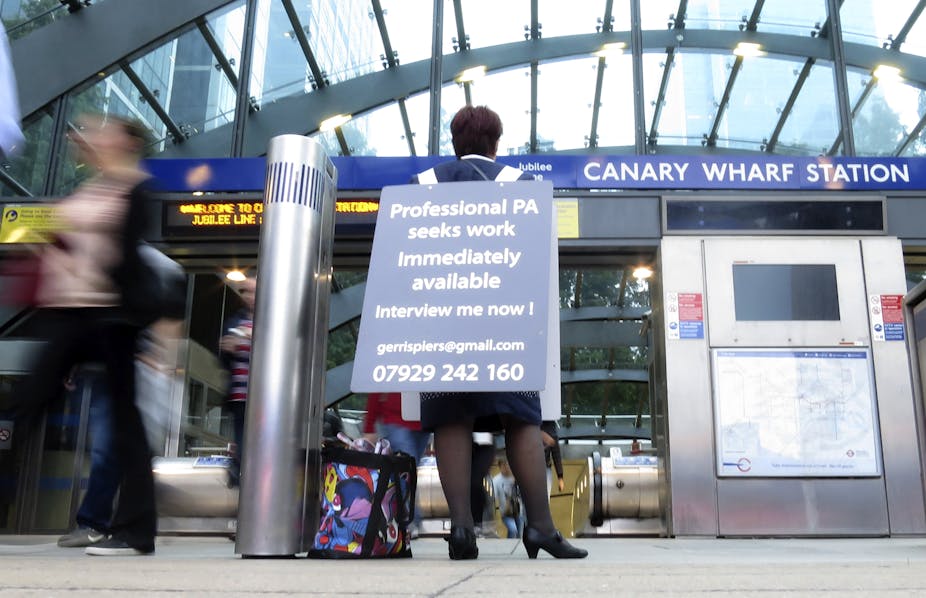The British job market is looking refreshingly stable: there were fewer unemployed people in the UK at the end of 2015 than at any time since 2005. The latest figures from the Office of National Statistics showed that the unemployment rate for over-16s was 5.1% between October and December 2015, down from 5.7% a year earlier.
In such times of increasing employment – there were 521,000 more people in work at the end of 2015 than the end of 2014 – it can be easy to stop thinking about the risk of being laid off. Yet research carried out by my colleagues and I has found that many couples ignore the negative signs, preferring to hope that they will not be affected by job loss. They act only when all hopes are dashed.
It’s long been considered that spouses (usually women) can act as a reserve army of workers, stepping in to pick up paid work when their partner loses their job.
But we found that even during times of economic crisis, this doesn’t always happen. Personal preferences, domestic and labour market constraints and issues around gender norms act are all factors that stop spouses from stepping into their partner’s role as the breadwinner – except in the extreme situation where the financial survival of the household is under threat.
Through in-depth interviews with 17 couples, we explored the ways in which they coped during times of squeezed budgets and economic uncertainty. The sample was carefully drawn from Understanding Society’s Innovation Panel, an annual longitudinal survey that gathers a wealth of information about how the lives of people in UK households evolve.
From the survey data we could tell if couples had experienced some form of job loss during the period between 2008 and 2011 – arguably the worst years of the financial crisis. The sample was selected to reflect a diverse range of household and family profiles, including couples with or without children and from a range of incomes across the UK.
In denial
The findings suggest that people can be rather unprepared for losing their job, despite quite strong indicators that it is likely to happen. Even where participants talked about the prospect of redundancy as inexorable, they often did nothing until redundancy notices were served and spoke of their “shock” that it had actually happened.
One woman we interviewed, Gail, spoke about her husband, who had been an executive in the construction industry, losing his job as:
It was inevitable. They were going to sort of get rid of him … I think he sort of got an inkling it was going to happen, but of course you go on and you think, ‘Oh, it might blow over,’ but you get a gut feeling … So I would say probably about four weeks, maybe a couple of months absolute, you know, before we knew. But even then, you know, we didn’t know. And when it did happen, we were absolutely gobsmacked.
Participants also told us how although they could see others around them losing their jobs, they felt that they would somehow be protected from job cuts. Roger, a technical manager, spoke with some annoyance and bewilderment about how he lost his job while others kept theirs.
Well, the department … they kept cutting, cutting, cutting … but I just felt that, ‘Hang on. It shouldn’t have been me.’ … So I thought right up to a month before that it was going to be … I was going to be the survivor and the other guy was going to go.
Got a job? Keep it
For some of those currently in work, the spectre of redundancy could be very evident – but staying put was seen as preferable to jumping ship. Ian, an IT manager, explained this in the sense of better the devil you know:
You’ve got the choice of either hoping things are going to get better or decide there’s some better opportunities elsewhere, … at the moment, I’m just hanging in there. I was put at risk redundancy-wise, I’ve just come through that and it could well be that if things don’t get better that will happen again.
Ian had a job, whereas he knew a lot of people in his line of work that didn’t. As he saw it, his best option was to keep his head down, work hard and hope for the best.
Almost by definition, being unemployed is distressing. It means you are ready to work, looking for a job but can’t find one. To handle any anxieties about the likelihood of this happening, people might prefer to overoptimistically rate their chances of keeping hold of their job.
In times of recession people can also feel particularly vulnerable to the threat of redundancy but choose to stick with what they have, rather than look for a more secure job, because it’s perceived as their best option among a set of poor alternatives.
Despite the recent falls in the unemployment rate, the figures show that being out of work is still an experience faced by many. As our research looked at unemployment in times of recession, it is not clear whether people take the same approach when the economic outlook is more positive – but we should be alert to the fact that they might. If a shock factor exists in times of recession – how much more shocking might it be to lose your job during relative prosperity.

